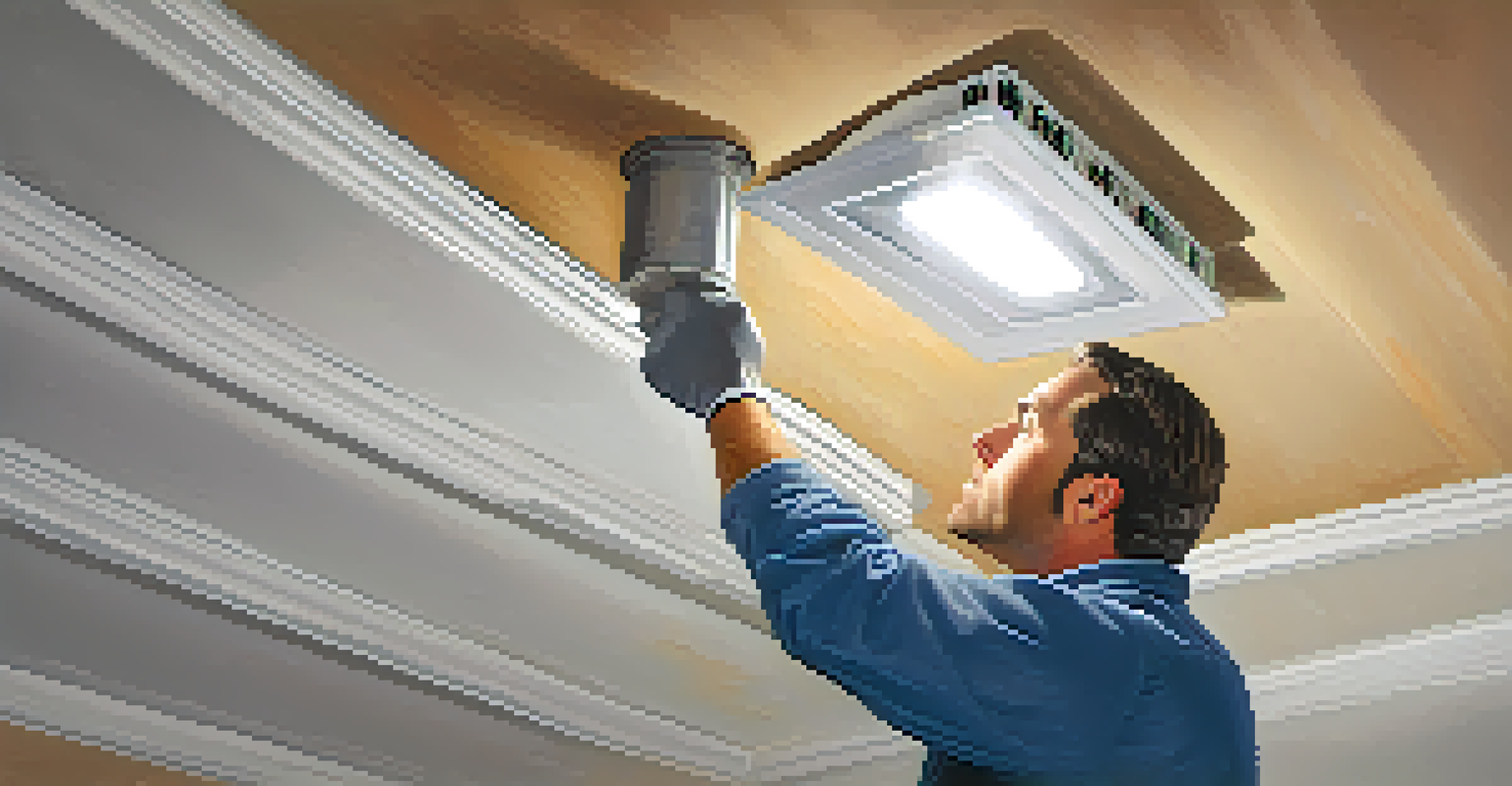The Role of Home Inspections in Ensuring Healthy Indoor Air

Understanding Indoor Air Quality and Its Importance
Indoor air quality (IAQ) refers to the air quality within buildings and structures, especially as it relates to the health and comfort of the occupants. Factors affecting IAQ include pollutants, humidity levels, and ventilation. Poor IAQ can lead to various health issues, such as allergies, asthma, and respiratory problems, making it essential to prioritize.
The air you breathe can impact your health, and improving indoor air quality can lead to a more comfortable, healthier living environment.
A common analogy is thinking of your home as a vessel; just as a ship needs clean water to sail smoothly, your home requires clean air for you to thrive. The air we breathe at home significantly impacts our overall well-being, and understanding this connection is the first step toward ensuring a healthier living environment.
By regularly monitoring and improving IAQ, we can create a safe haven for ourselves and our families. Home inspections play a crucial role in this process, identifying potential hazards and ensuring that the air we breathe is as fresh and clean as possible.
How Home Inspections Identify Air Quality Issues
Home inspections are thorough evaluations of a property's condition, including its air quality. Inspectors typically check for mold, allergens, and other pollutants that can compromise indoor air. For example, they might find hidden mold in damp areas, which could go unnoticed but significantly affect air quality.

The inspection process often includes assessing ventilation systems, which play a vital role in maintaining good air quality. If these systems are clogged or malfunctioning, they can recirculate stale air or fail to filter out pollutants, leading to potential health issues.
Importance of Indoor Air Quality
Indoor air quality significantly affects health and comfort, necessitating regular monitoring and improvement.
By uncovering these issues, home inspections provide an essential service, allowing homeowners to address problems before they escalate. This proactive approach helps ensure that your indoor environment remains healthy and pleasant to live in.
The Impact of Mold on Indoor Air Quality
Mold is one of the most common culprits of poor indoor air quality. It thrives in damp, humid environments and can release spores that trigger allergic reactions and respiratory issues. An inspection can identify mold growth before it becomes a serious problem, safeguarding your family's health.
Regular inspections are essential for preventing air quality issues, as they allow homeowners to stay ahead of potential problems.
Imagine finding a small leak in your roof; if left unchecked, it could lead to significant water damage and mold growth. Similarly, early detection of mold through a home inspection can prevent costly repairs and health risks down the line.
By addressing mold promptly, homeowners can significantly improve their indoor air quality. Regular inspections ensure that any mold problems are caught early, leading to a healthier living space and peace of mind.
The Role of Ventilation in Indoor Air Quality
Ventilation is key to maintaining good indoor air quality by ensuring fresh air circulates throughout your home. Inadequate ventilation can trap pollutants and moisture, creating a breeding ground for mold and other allergens. Home inspectors assess ventilation systems to ensure they function properly and effectively.
Think of ventilation as the lungs of your home; just as your lungs need clean air to function, your home needs proper airflow to stay healthy. If these systems are not working well, it can lead to stale air and health concerns for residents.
Role of Home Inspections
Home inspections are essential for identifying air quality issues like mold and allergens, helping maintain a healthy living environment.
By identifying ventilation issues during an inspection, homeowners can take action to improve air quality. This might involve cleaning ducts, repairing ventilation fans, or even upgrading systems to promote better airflow.
Identifying and Mitigating Allergens in the Home
Allergens such as dust mites, pet dander, and pollen can accumulate in our homes, impacting indoor air quality. Home inspections often involve checking for sources of these allergens and recommending ways to mitigate them. For example, an inspector might suggest using HEPA filters or regular cleaning practices to reduce allergen levels.
Imagine having a party at home; you want everything to be clean and inviting. Similarly, maintaining a clean indoor environment free of allergens is crucial for everyone's comfort and health.
By understanding where allergens come from and how to combat them, homeowners can create a healthier living space. Regular inspections help identify problem areas and provide actionable solutions to keep your indoor air fresh and clean.
The Importance of Regular Home Inspections
Just as you would schedule regular check-ups with your doctor to maintain your health, regular home inspections are vital for preserving indoor air quality. They help identify potential issues before they escalate, allowing homeowners to take proactive measures. Regular inspections can lead to significant long-term savings on repairs and health-related expenses.
Think of your home as an investment; maintaining its value requires ongoing attention. Inspections serve as a preventive measure, ensuring that everything from your air quality to the structural integrity of your home remains in top shape.
Choosing the Right Inspector
Selecting a qualified home inspector is crucial for effectively assessing and addressing indoor air quality concerns.
By making home inspections a regular part of your maintenance routine, you are not only protecting your property but also safeguarding your family's health. This practice fosters a safe and comfortable living environment for everyone.
Choosing the Right Home Inspector for Air Quality Concerns
Selecting a qualified home inspector is crucial when addressing air quality issues. Look for inspectors who specialize in indoor air quality assessments and are familiar with mold, allergens, and ventilation systems. Checking credentials and reviews can help ensure that you're making a wise choice.
Think of finding the right inspector as hiring a guide for a challenging hike; you want someone experienced who knows the terrain well. A knowledgeable inspector can help navigate potential air quality issues and provide valuable insights into maintaining a healthy home.

By choosing the right professional, homeowners can gain confidence that their indoor air quality will be thoroughly assessed. This decision can make a significant difference in creating a safe and healthy living environment.